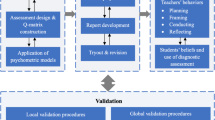Abstract
Fueled by the demand to cultivate deep understanding in 21st-century education, schoolteachers have a burning desire to assess the elements of understanding that students struggle to achieve. However, there has been limited consideration of quantitatively identifying these strengths and weaknesses. Hence, this study proposes a way to assess these by using a class of statistical models called cognitive diagnostic models. This study consists of three parts: development and administration of the diagnostic mathematical test, analysis using the statistical models, and development of feedback sheets for students and teachers. We believe this assessment system can be implemented in digital tools in the future.
Access this chapter
Tax calculation will be finalised at checkout
Purchases are for personal use only
Similar content being viewed by others
References
Rupp, A. A., Templin, J., Henson, R. A.: Diagnostic measurement. Theory, Methods, and Applications. New York: Guilford (2010)
Bellanca, J.A.: Deeper learning: Beyond 21st century skills. In: Solution Tree Press, Bloomington (2014)
National Research Council.: a framework for K-12 science education: Practices, crosscutting concepts, and core ideas. National Academies Press (2012)
Rittle-Johnson, B., Alibali, M.W.: Conceptual and procedural knowledge of mathematics: does one lead to the other? J. Educ. Psychol. 91(1), 175 (1999)
Lachner, A., Nückles, M.: Tell me why! content knowledge predicts process-orientation of math researchers’ and math teachers’ explanations. Instr. Sci. 44(3), 221–242 (2016). https://doi.org/10.1007/s11251-015-9365-6
Manalo, E., Uesaka, Y., Chen, O., Ayabe, H.: Showing what it looks like: teaching students to use diagrams in problem solving, communication, and thinking. In: Deeper Learning, Dialogic Learning, and Critical Thinking. Routledge, pp. 230–246 (2019)
Clark, I.: Formative assessment: assessment is for self-regulated learning. Educ. Psychol. Rev. 24(2), 205–249 (2012)
Sessoms, J., Henson, R.A.: Applications of diagnostic classification models. Literat. Rev. Crit. Commen. 16(1), 1–17 (2018)
Tatsuoka, K.K.: Rule space: an approach for dealing with misconceptions based on item response theory. J. Educ. Measure. 20, 345–354 (1983)
Sun, Y., Suzuki, M., Toyota, T.: Designing effective feedback for cognitive diagnostic assessment in web-based learning environment. In: Proceedings of the 21st International Conference on Computers in Education, pp. 115–120 (2013)
Junker, B.W., Sijtsma, K.: Cognitive assessment models with few assumptions, and connections with nonparametric item response theory. Appl. Psychol. Meas. 25(3), 258–272 (2001)
Zhan, P., Jiao, H., Man, K., Wang, L.: Using JAGS for Bayesian cognitive diagnosis modeling: a tutorial. J. Educ. Behav. Stat. 44(4), 473–503 (2019)
Su, Y.-S., Yajima, M.: R2jags: using R to run ‘JAGS’ (2020)
Vehtari, A., Gelman, A., Simpson, D., Carpenter, B., Bürkner, P.C.: Rank-normalization, folding, and localization: an improved R for assessing convergence of MCMC (with discussion). Bayesian Anal. 16(2), 667–718 (2021)
de la Torre, J., Hong, Y., Deng, W.: Factors affecting the item parameter estimation and classification accuracy of the DINA model. J. Educ. Meas. 47, 227–249 (2010)
Jang, E.E.: A validity narrative: effects of reading skills diagnosis on teaching and learning in the context of NG TOEFL. University of Illinois at Urbana-Champaign (2005)
Madison, M.J., Bradshaw, L.P.: Assessing growth in a diagnostic classification model framework. Psychometrika 83(4), 963–990 (2018). https://doi.org/10.1007/s11336-018-9638-5
Zhan, P., Jiao, H., Liao, D., Li, F.A.: Longitudinal higher-order diagnostic classification model. J. Educ. Behav. Stat. 44(3), 251–281 (2019)
Ministry of Education, Culture, Sports, Science and Technology.: FY2020 MEXT general budget highlights (2020). Accessed 31 Aug 2022. https://www.mext.go.jp/en/unesco/mext_00002.html
Author information
Authors and Affiliations
Corresponding author
Editor information
Editors and Affiliations
Rights and permissions
Copyright information
© 2023 The Author(s), under exclusive license to Springer Nature Switzerland AG
About this paper
Cite this paper
Saso, S., Oka, M., Uesaka, Y. (2023). Development of Assessment Tools for Depth of Understanding Quantitatively with Cognitive Diagnostic Models. In: Arai, K. (eds) Advances in Information and Communication. FICC 2023. Lecture Notes in Networks and Systems, vol 651. Springer, Cham. https://doi.org/10.1007/978-3-031-28076-4_55
Download citation
DOI: https://doi.org/10.1007/978-3-031-28076-4_55
Published:
Publisher Name: Springer, Cham
Print ISBN: 978-3-031-28075-7
Online ISBN: 978-3-031-28076-4
eBook Packages: Intelligent Technologies and RoboticsIntelligent Technologies and Robotics (R0)




